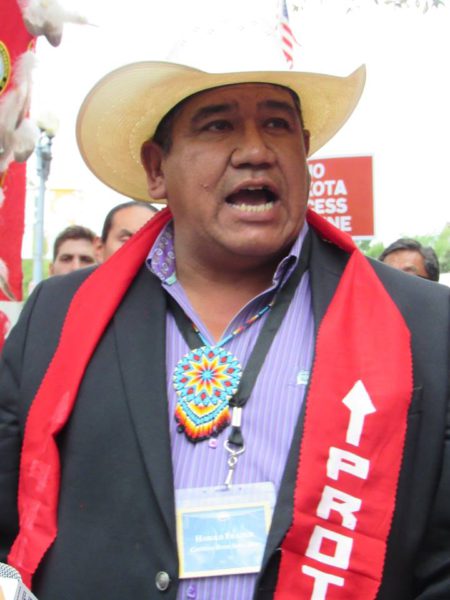
- Details
- By Native News Online Staff
EAGLE BUTTE, S.D. — The upcoming presidential visit by President Donald Trump to Mount Rushmore has created quite a stir in Indian Country.
American Indian protesters will be on hand in Keystone, S.D. as a reminder that the Sioux tribes still take claim to the Black Hills, where Mount Rushmore is located. Historically, the site was called Six GrandFathers by the Sioux.
Last week, Oglala Sioux Tribal President Julian Bear Runner said that he wants the faces of the four presidents removed from Mt. Rushmore.
Cheyenne River Sioux Tribal Chairman Harold Frazier weighed in this morning with the following statement:
“Nothing stands as a greater reminder to the Great Sioux Nation of a country that cannot keep a promise or treaty then the faces carved into our sacred land on what the United States calls Mount Rushmore. We are now being forced to witness the lashing of our land with pomp, arrogance and fire hoping our sacred lands will survive. This brand on our flesh needs to be removed and I am willing to do it free of charge to the United States, by myself if I must.
Visitors look upon the faces of those presidents and extoll the virtues that they believe make America the country it is today. Lakota see the faces of the men who lied, cheated and murdered innocent people whose only crime was living on the land they wanted to steal.
The United States of America wishes for all of us to be citizens and a family of their republic yet when they get bored of looking at those faces, we are left looking at our molesters. We are the ones who live under the stare of those who have wronged us while others have the privilege to look away and move on, we cannot.
When I can remove those faces from our land, I believe I would not be alone.”
More Stories Like This
Native News Weekly (August 25, 2024): D.C. BriefsCheyenne River Youth Project to Celebrate Women’s Strength at Barbie-Themed Passion for Fashion on March 14
Celebrating Native American Women
Native Bidaské: The Illusion of Freedom and the Myth of America 250, Leonard Peltier Speaks Out
Monday Morning (March 2, 2026): Articles You May Have Missed This Past Weekend
Help us defend tribal sovereignty.
At Native News Online, our mission is rooted in telling the stories that strengthen sovereignty and uplift Indigenous voices — not just at year’s end, but every single day.
Because of your generosity last year, we were able to keep our reporters on the ground in tribal communities, at national gatherings and in the halls of Congress — covering the issues that matter most to Indian Country: sovereignty, culture, education, health and economic opportunity.
That support sustained us through a tough year in 2025. Now, as we look to the year ahead, we need your help right now to ensure warrior journalism remains strong — reporting that defends tribal sovereignty, amplifies Native truth, and holds power accountable.
 The stakes couldn't be higher. Your support keeps Native voices heard, Native stories told and Native sovereignty defended.
The stakes couldn't be higher. Your support keeps Native voices heard, Native stories told and Native sovereignty defended.
Stand with Warrior Journalism today.
Levi Rickert (Potawatomi), Editor & Publisher

